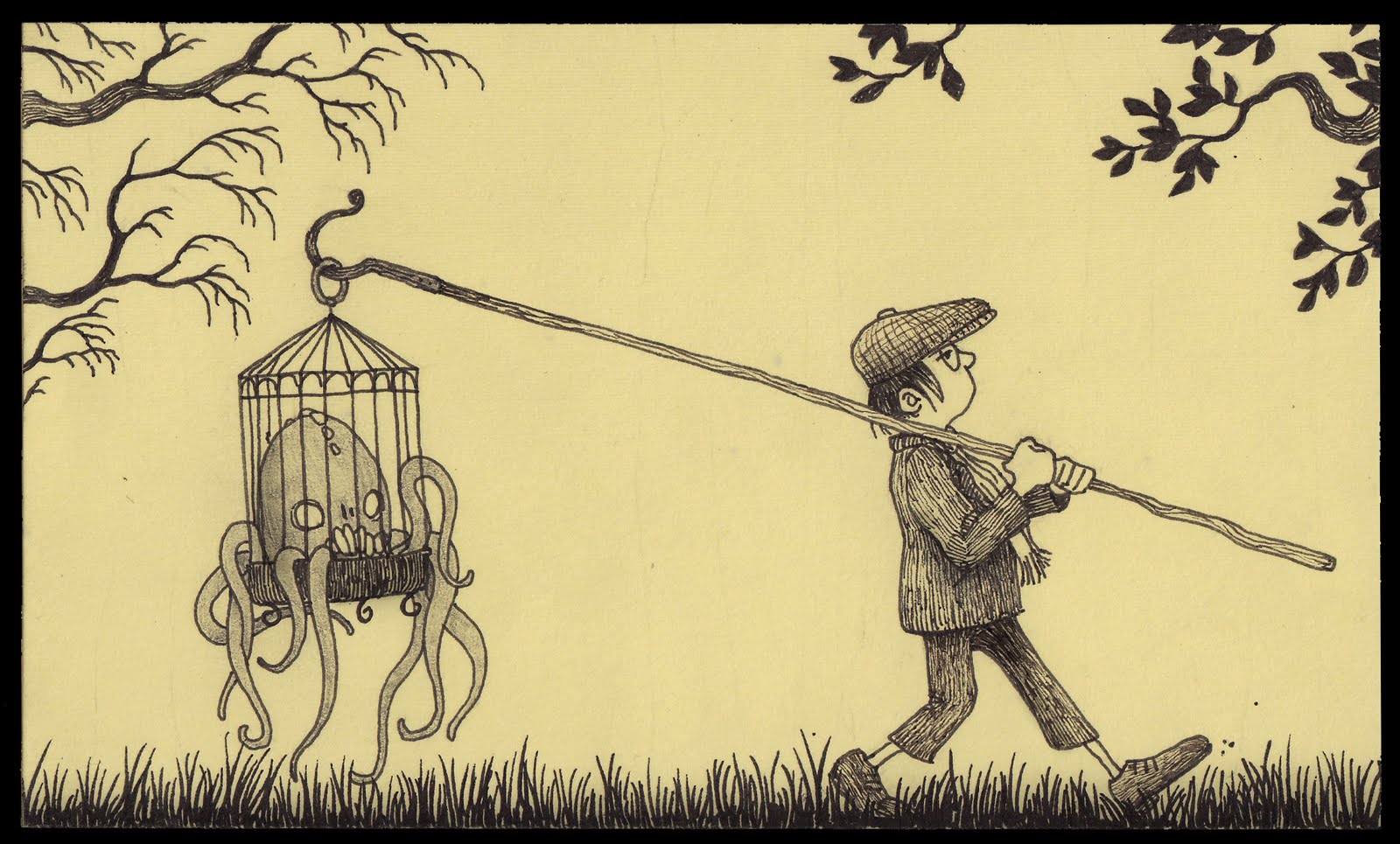Procrastination How to cage the demon who prevented to move towards the goal

Illustration by John Kenn
Why does it take more time to study rare autoimmune diseases than to search for a good doctor, and dirty dishes seem more important than a business plan?
Procrastination - a crime in which everyone is guilty.
')
The main ingredient of success is action. To succumb to procrastination is the same as doing nothing at all. Another problem is that we still carry out our plans. Yes, we postpone until the last and wait for the deadline, but still get down to business. And this is bad, because there is a false confidence in the completion of the task, regardless of the time when the action begins.
Even worse when there is no deadline at all. How long can we wait until the opportunity is completely lost?
Life goals have no deadline, and therefore no consequences of its breakdown. So we can postpone indefinitely and take no action. But without action, there will be no results.
Take a simple example.
I have a great idea for the site, I can make a decent project. At the start-up it does not pull, but as a hobby a profitable one, completely. There is one problem: I am not an expert in web development, but this is easily solved - you need to ask a specialist for help, and the trick is done.
Active searches do not attract me, and therefore I decide to tell people about the project and let me know that I will be happy to help, someone will be interested and maybe I can quickly find a partner.
The plan is as follows: prescribe in detail the essence of the project on paper, create a target on Smartprogress , throw a call on social networks and continue to work with feedback.
But now a month out of four points nothing has been done. Walking the dog is more important than registering a plan, and then it's time to have lunch, and now the day is coming to an end.
Although, if you count it, it will take three hours to complete all the work, for there is no need to prescribe in detail. It is enough to convey the essence, and then in the dialogue we will already devote into details.
I repent, I am a sinner - I am a procrastinator
How to notice procrastination
Primary action: I postpone. For what time? It all depends on the task. Sometimes indefinitely.
The main signs of procrastination:
- We wait until the last second.
We know exactly what needs to be done and when. But to know is not to do. We are waiting for the deadline, as we are sure that we will have time at the last moment.
Procrastination is like a dose for a drug addict, it gives pleasant feelings. At the last moment we will take action and get a rush of adrenaline. So there is a dependence on postponing.
- We begin to work, but much later than we intended.
Until we rest on the deadline.
We spend more time on anxiety than on business and are more nervous than we labor.
And then we feel a sense of guilt, as if excitement was not enough.
- We don't have time for really important things.
There are many thoughts on how to change life for the better, but there are so many responsibilities, and therefore you have to wait.
We are waiting for the right moment, because intuition will tell you better than a sense of duty.
Let's wait until the stars converge.
Failure to initiate action

The number of excuses for procrastination is infinite, but the ability to invent them does not exempt from the consequences of unfulfilled cases.
There are several theories of procrastination. Some of them are about features of avoided tasks. It has been found that usually unpleasant, complicated, stressful and difficult things are set aside.
Others - about the procrastinator himself. It is trite, but less disciplined, thoughtful and not very successful people often suffer with procrastination.
The fact is that both theories are true. For procrastination, the combination of personality and task characteristics is important.
To cope with the desire to put everything off, you need to change either your attitude towards work or the work itself. For example, changing the goal is simple, but not everything can be abandoned. Then change yourself - all that remains.
Look into the brain

Cognitive functions are involved in the pursuit of a goal; there are many of them: managing emotions, controlling impulses, attention, reasoning, but the main one is the executive function.
It is a subtle function in the brain, and it determines creativity, success, and satisfaction with life more than intelligence. It allows you to select, plan, adjust, track and stop actions.
Setting goals the brain consistently passes through all stages. But in order to do something, you need to know what and how exactly, and then start, execute and check the result.
To achieve the goal, it is necessary to get down to business, and the most important stage in the executive chain is initiation, it is a transition from plans to actions.
If initiation fails, we will not get down to business. It creates a gap between the formulation of ideas and goals and the beginning of actions. Lack of transition - procrastination.
A person can have brilliant ideas, high dreams and ambitious plans, but without initiation they will remain in my head.
Prerequisites for procrastination
- Skills.
If we think that we do not have the necessary skills and knowledge to solve the problem, then the brain will slow us down and, as a result, procrastination. - Variants.
- There are no options - when it is not clear what to do, we will not do anything. Without options, the brain does not initiate movement toward the goal.
- There are a lot of options - with a large number of options, we are immersed in stress, and the brain can refuse to choose.
“Options are vague, vague, and vague — actions are delayed.”
- Options compete - the brain performs only one task at a time, you have to make choices and some goals will be put off in favor of others. - Result.
Unknown outcome undermines motivation and makes it put off until later. But a positive perspective is pushing to get to work. Sometimes the risk of not getting what you want motivates. - Novelty.
The brain is effective in familiar areas, and novelty can block initiation. When the task is familiar - the brain implements everything automatically. - Emotional temperature.
The sensation of the task determines the chances of its success. Emotions - the first reaction of the brain, which appeared in the process of evolution, to make a decision. Negative ones turn off initiation and lead to procrastination, and bright and positive ones force you to postpone the case due to an excess of energy, making it difficult to concentrate and calmly think things over, start to act prudently. Ideal - a slightly elevated mood. - The importance of the task.
When it seems that the task is not related to our goals, it receives a low priority and is postponed. For example, employees are more satisfied and workable if they see the importance of their actions for a common goal. Therefore, some companies involve personnel in developing strategic plans. - Resources.
Resource-intensive tasks are postponed more readily than resource-saving ones. To complete the task you need five resources: time, information, money, energy and support. The brain “makes a budget”, and if something is missing, procrastination. Therefore, before making a decision, it is important to assess your capabilities. Because of the revaluation, there will be a constant postponement of cases, and due to underestimation there may not be enough resources.
Side effects
The consequences of procrastination are colossal - ideas remain in the head, and intentions do not turn into actions.
If you constantly weigh and doubt everything, the projects will remain on paper. And most importantly - your life can remain the same only because you gave priority to evading activities.
Dreams are turning into nightmares

Putting off work, we will not turn the dream into reality. Procrastinators engage in self-deception and live in illusions, not realizing that every passing day costs more and more. They confuse the optimistic “start is never too late” with the crafty “until you can not start.”
Unreasonable confidence that there will be enough time turns into regret for lost chance.
Due to procrastination, a person is not ready for the opening opportunities. Chances appear by chance, out of nowhere, without warning, and do not stay long. You need to grab them, otherwise they will disappear.
Due to procrastination, the quality of work suffers: because of haste, it turns out to be untidy, careless, with errors.
If you postpone until the last, then there will be no time to review the work, correct mistakes, fill in the gaps, edit and arrange beautifully, develop ideas, refine skills and learn new ones.
A quality product takes time.
Procrastination is the seal of insecurity, putting it off until later, it is easy to pass for a person who does not call back, does everything with a delay or is slovenly at work.
Also, chronic procrastination strikes at self-confidence.
How to overcome procrastination
This is a powerful daily habit, and will have to be fought on many levels. Before you begin, you need to identify the pending obstacles, assess the risks, think about goals. And determining the steps to be done, answer the questions:
- What skills do I need? Do I know everything?
- What solutions of the problem exist and do they exist at all?
- What else do you want to do instead of concentrating on the tasks?
- What result should I expect?
- I know the problem? Have I done something like this before?
- What emotions bother me? Excessive pessimism, anxiety, disappointment? Or am I over-excited and can't concentrate?
- Is there excessive optimism, or do I have a feeling of guilt?
- Is this task important to me? How much? How to increase its priority?
- What resources will be needed? Do I have enough of them? If not enough, where to get them?
Seven strategies to combat procrastination
1. Fill the gaps in skills:
- Learn by yourself.
- To reassign to someone who knows better what to do.
- Switch to what is really known.
2. Decide on options
- Clarify the situation and accurately determine the necessary actions.
- Brainstorm He will help to come up with something when it seems that there is no way out.
- Make inquiries. How do other people act with similar goals?
- Ask for help. Find experienced people or contact friends, colleagues, family.
- With an abundance of options: prioritize and create a list of what not to do.
3. Refine results
- List the advantages: write out all the benefits from the completion of the project, indicate the benefits for themselves and others.
- Visualize in the most detailed way.
- Observe others: find people who have achieved success, which we dream of, and draw inspiration from them.
A strong desire to get our plans will not let you go astray.
4. Cope with the novelty
- To make a case in the schedule: you need to set aside tasks for a certain time and come to them every day as a meeting.
- Just start: take the task and, coming up from any side, begin to engage in it. The main thing - to do.
- Do at least a little but every day: perform at least one task related to the goal. Before going to bed, check whether something is done or not, which is related to the task, and if not, get out of bed and complete any trifle.
- Use routine: for example, call potential customers on the way to work in the morning.
Starting from scratch is both interesting and unusual and scary.
5. Curb emotions
- Proper emotional temperature is required. Emotions depend on other prerequisites for procrastination. For example, the immateriality of the task undermines motivation, and the lack of time increases anxiety. To regulate the emotional temperature you need to adjust other prerequisites.
6. Find significance
- Start keeping a diary of action .
- Check the list of avoided tasks. If the case is on the list, then somewhere there was a turn in the wrong place.
- Draw a line between points A and B. If the connection is not obvious - draw a mind map.
7. Build a resource budget
- Assess needs: time, information, money, energy, support.
- Mark target dates: you need to develop the habit of setting intermediate deadlines, they will help not to lose focus and better organize time.
- Separate and conquer: it is necessary to make a list of major goals and write out the tasks for each of them, without which they will not be achieved. And as you get acquainted with the goals to change and supplement tasks.
- Put restrictions: you must be adamant about the costs.
I hope that the tips will help you cope with procrastination, or at least begin to work on its elimination.
All good and clear goals!
Other useful articles:
The goal as an antidepressant is about how and why setting goals and objectives can help cope with depression or at least relieve symptoms.
Read more articles on our blog: SmartTalks
A source:
- “Brain with obstacles. 7 hidden barriers that prevent you from achieving goals "Theo Tsaucidis
- Original: "Brainblocks: Overcoming the 7 Hidden Barriers to Success" by Theo Tsaousides
Source: https://habr.com/ru/post/321188/
All Articles
